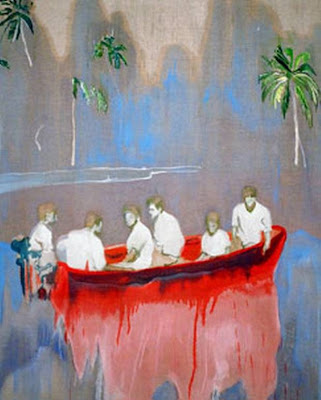This is the second of two posts relating to The Death and Life of the Frontier, an article published in the first quarterly (print) edition of Nautilus. It expands on a couple of points in the last paragraphs of the article, marked here in bold. The first set of notes is here. An excerpt from the article is online here.
We should not dismiss our potential to innovate more intelligently and benignly in the future than has been the case in the past.
In Arctic Dreams Barry Lopez reports a reflection from an archaeologist on the legacy of long-gone indigenous peoples of the high North: “Everything we are is in our spirit.” Some poets in our own culture have said as much. Henry David Thoreau wrote:
Time is but the stream I go a-fishing in. I drink at it; but while I drink I see the sandy bottom and detect how shallow it is. Its thin current slides away, but eternity remains. I would drink deeper; fish in the sky, whose bottom is pebbly with stars. I cannot count one. I know not the first letter of the alphabet. I have always been regretting that I was not as wise as the day I was born.Richard Jefferies wrote:
Time has never existed, and never will; it is a purely artificial arrangement. It is eternity now, it always was eternity, and always will be.Dreams can contain much darkness as well as light. Lopez describes a find at an Ipiutak burial site at Point Hope, Alaska:
A small carved caribou hoof was protruding on a shaft from the pelvic region of a human skeleton. Clearing away more earth revealed that this long ivory shaft penetrated the entire vertebral column and emerged in the skull, where it curved forward in space where the mouth would have been. It terminated in a miniature hand, opened in supplication.
With our vastly greater knowledge and capabilities, what else might we yet conceive?
The physicist David Deutsch suggests that the human capacity to explain the fabric of reality may one day give our successors the ability to extend the duration of a main sequence star such as the Sun. This is a staggering thought, perhaps a hopeful one. One thinks of Thoreau at his happiest, writing next to his beloved “ Earth's eye,” Walden Pond:
These may be but the spring months in the life of the race...The sun is but a morning star.But there are other, bleaker possibilities. Stanisław Lem warns:
Someone who is capable of switching stars on and off will also be capable of annihilating whole inhabited globes, transforming himself in this way...[into] a criminal on a cosmic scale.Wade Davies is more hopeful:
The path we have taken is not the only one available. Our destiny...is not indelibly written in a set of choices that demonstrably and scientifically have proven not to be wise. By their very existence the diverse cultures of the world bear witness to the folly of those who say that we cannot change, as we all know we must, the fundamental manner in which we inhabit this planet.Jonathan Bate writes:
The dream of deep ecology will never be realised here on Earth, but our survival as a species may be dependent on our capacity to dream it in the work of our imagination.
Image: Figures in Red Boat by Peter Doig

No comments:
Post a Comment